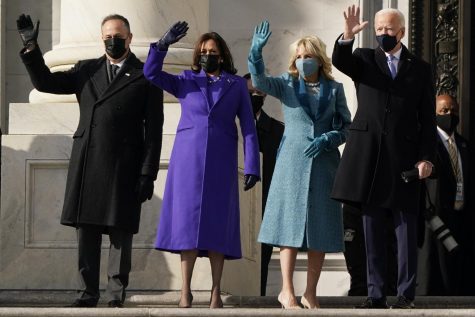Memes and fanvids: The blurred line between politics and pop culture
March 18, 2021

Nearly everyone with a social media account is now familiar with the infamous photo of U.S. Sen. Bernie Sanders (I-Vt.) bundled up, wearing patterned mittens and crossing his legs to keep warm at President Joe Biden’s inauguration.
The photo spread like wildfire on the internet, with people across the country creating memes and embroidered sweatshirts almost immediately.
This is just one example of the many ways politics and pop culture have started overlapping in recent years.
From famous music artists Lady Gaga and Jennifer Lopez performing at Joe Biden’s inauguration, to Generation Z’s growing interest in Vice President Kamala Harris’ stepdaughter Ella Emhoff and her eccentric style, to caricatures of Donald Trump resembling an orange, the connection between pop culture and politics is highly visible in everyday life.
According to Dick Simpson, professor of political science at University of Illinois at Chicago and former Chicago alderperson, politicians have been popular societal figures since the era of kings and queens. However, with the rise of social media over the last two decades, that popularity tends to feel more extreme.
“The country has become more polarized,” Simpson said. “So the people who support and oppose, for instance, Donald Trump, are much more militant in their views.”
Louise Bean, a sophomore film and television major, said the division between Democrats and Republicans has only grown larger over the last few years because of social media.
“The worship of [the] political celebrity does play into that division pretty heavily, because it basically creates an environment where there are different spheres of reality,” Bean said. “And people are getting their information from different places where there is no consensus on what the reality is.”
According to a 2016 study by the Pew Research Center, 25% of social media users follow political figures.
The study found that of that 25%, about 65% of users exclusively follow politicians who hold similar values, while 31% follow a mix of politicians who hold similar or opposing ideas to their own.
Generation Z’s approach to talking about politics can also be seen through memes of various political figures such as comparing U.S. Sen. Ted Cruz (R-Texas) to the Zodiac Killer and social media’s fascination with the fly that landed on former Vice President Mike Pence’s head during a vice presidential debate.
Some supporters of political figures also make fanvids, which are short video edits focused on a specific person that tend to romanticize their looks and actions.
“Honestly, I think [the memes are] funny,” said Skyla Stillo, a sophomore creative writing major. “It’s good that finally [politicians are] acting like humans, rather than robots just running the country.”
Tobey King, an artist who went viral on social media after posting a video of her crocheting a doll modeled after Bernie Sanders at Joe Biden’s inauguration, believes it is great for politicians to have a fan base because it forces people to pay attention to what they are doing.
During the 2016 presidential election, King crocheted dolls of various political figures. Each time she crochets a new doll, she does her own research to learn about them.
“It was my opportunity to figure out where I stood politically … and I really liked Bernie,” King said. “So it started with Bernie, and then I made Trump and Hillary … but was kind of a way for me to figure out who I liked.”
However, the idolization of political figures can make it difficult for people to truly be informed, Bean said.
“The worship of politicians and their cult of personality acts as a certain shorthand for people to invoke a name … without engaging with a particular ideology, policies or ideas in general about the betterment of the world,” Bean said. “You are able to align yourself with them without doing the legwork of dismantling oppressive systems.”
In spite of this, there are ways to support politicians without romanticizing them, Bean said. They said politicians are elected to represent constituencies, meaning elected officials need to be held accountable and “viewed critically”—not just through memes.
Simpson said it is possible to support a politician and also recognize they are going to make mistakes.
“Usually, any political figure has some flaws,” Simpson said. “So it’s worth having some balance in your understanding of the political figure, and you can still support a particular political figure without thinking they’re perfect.”







